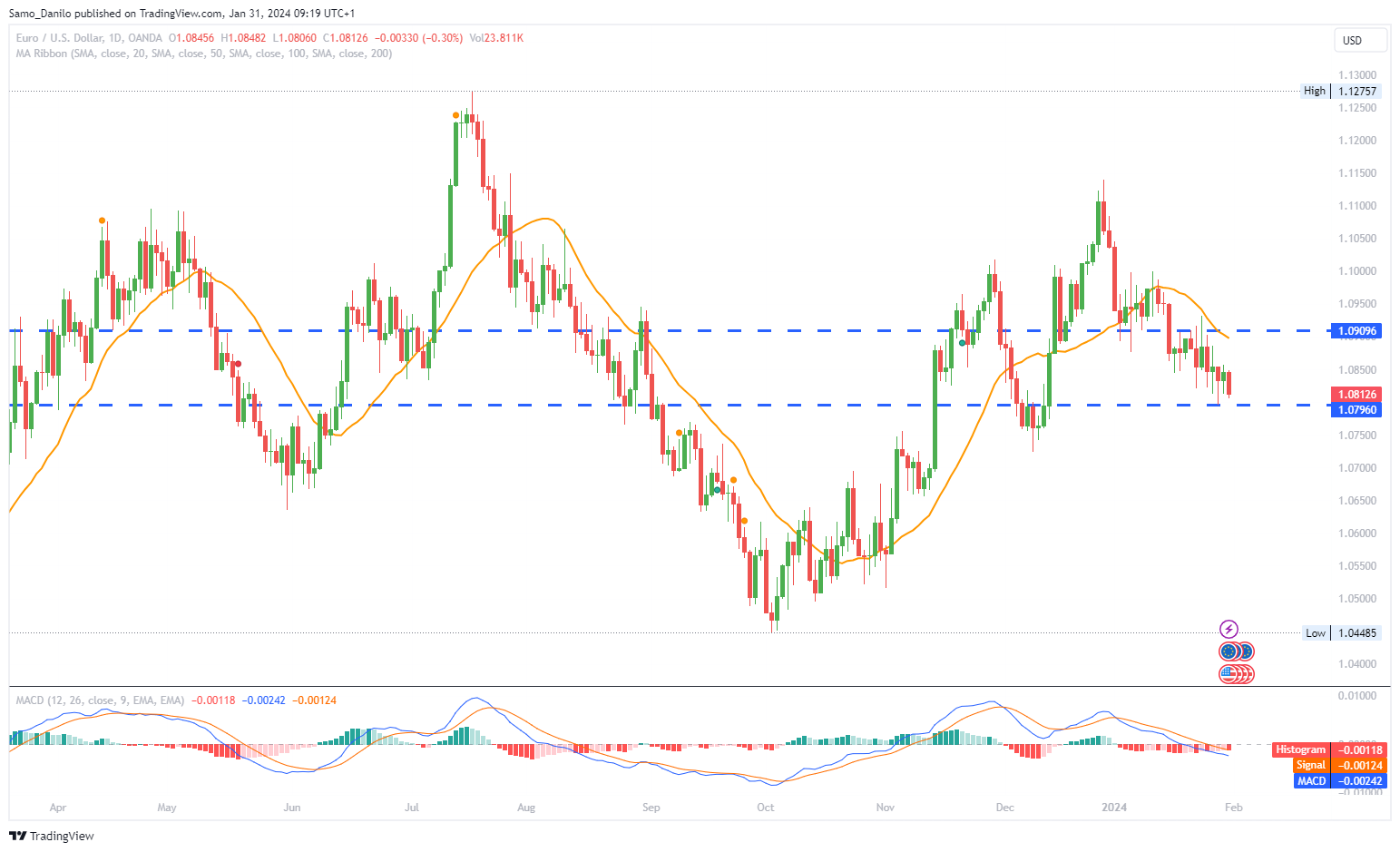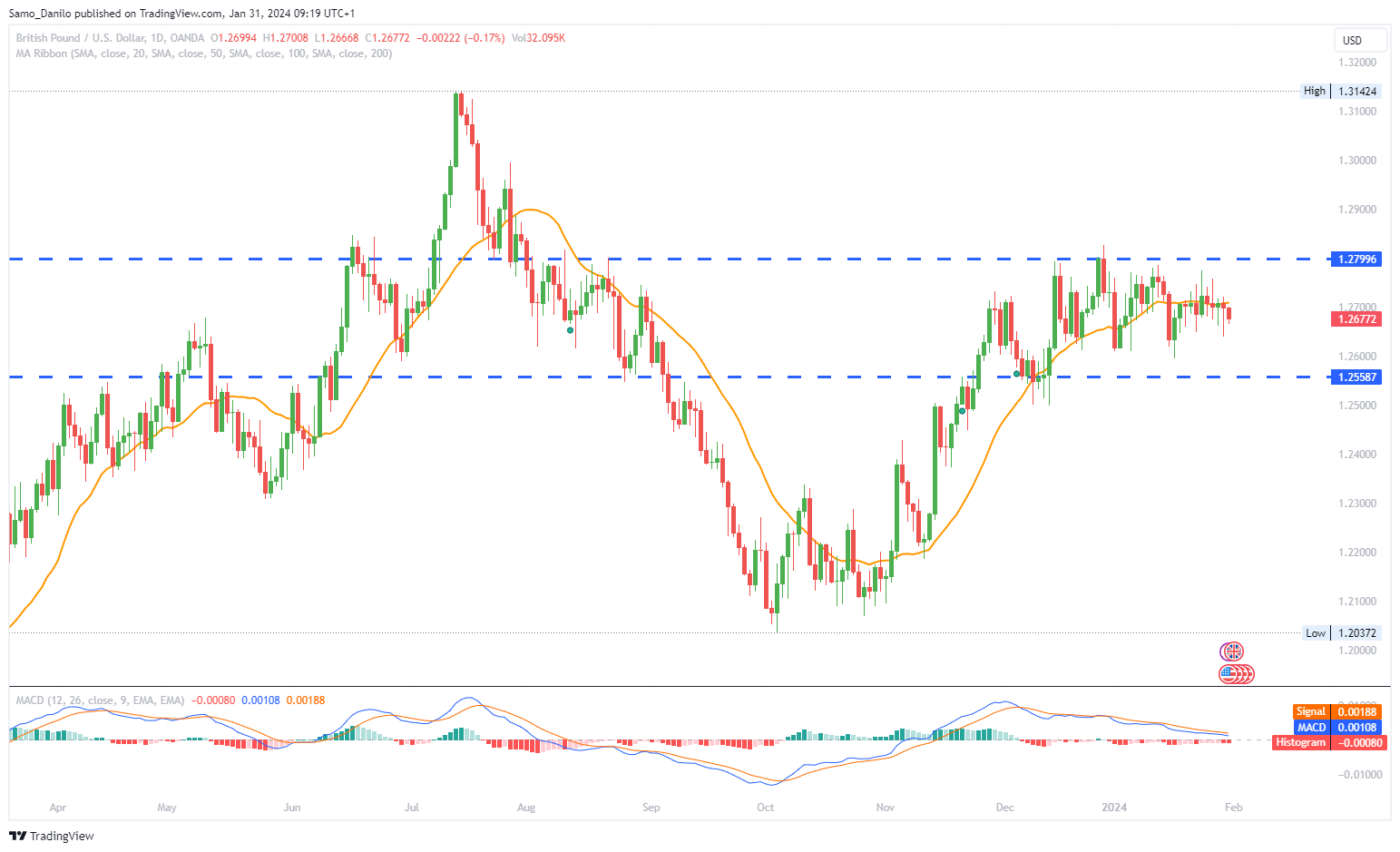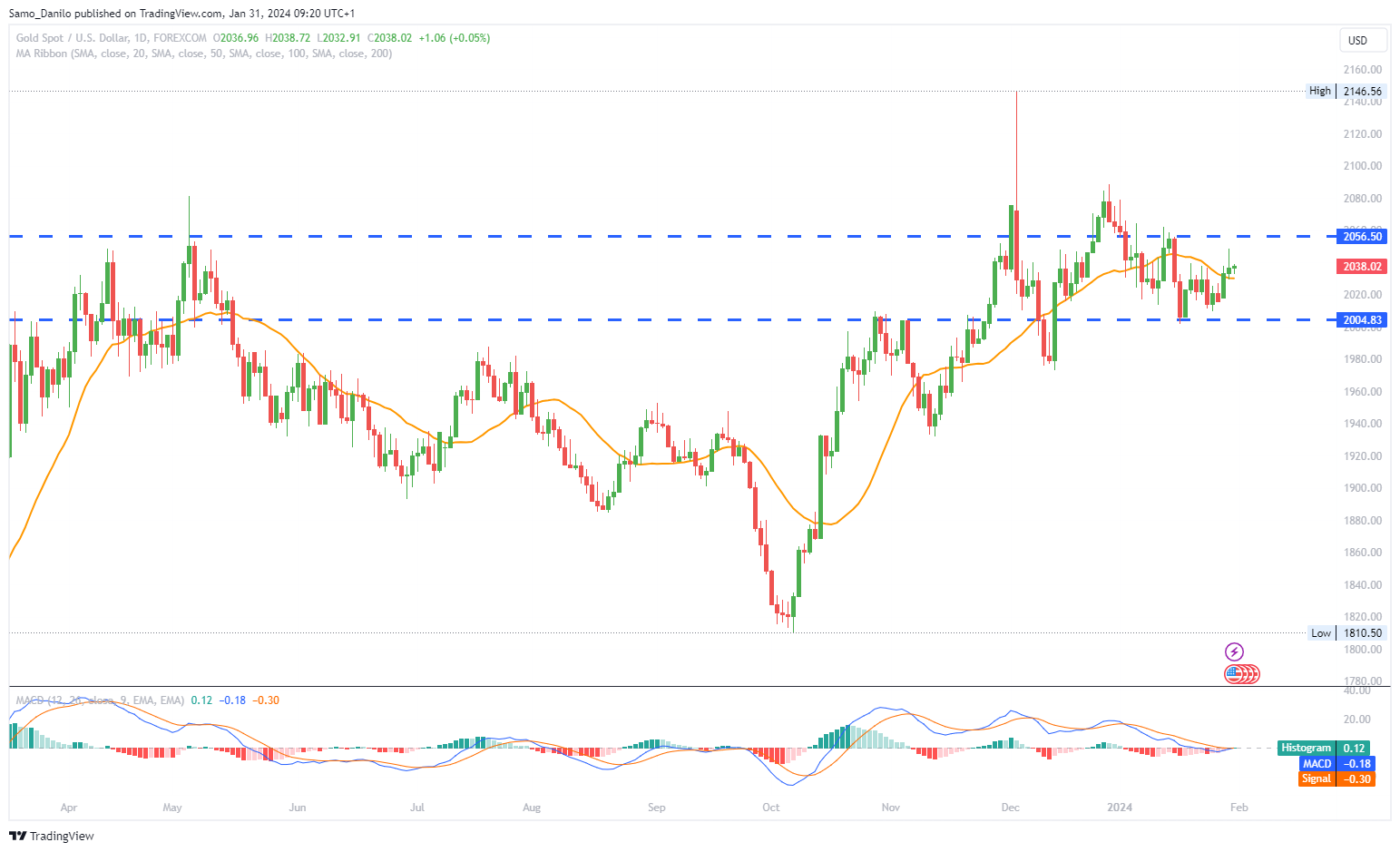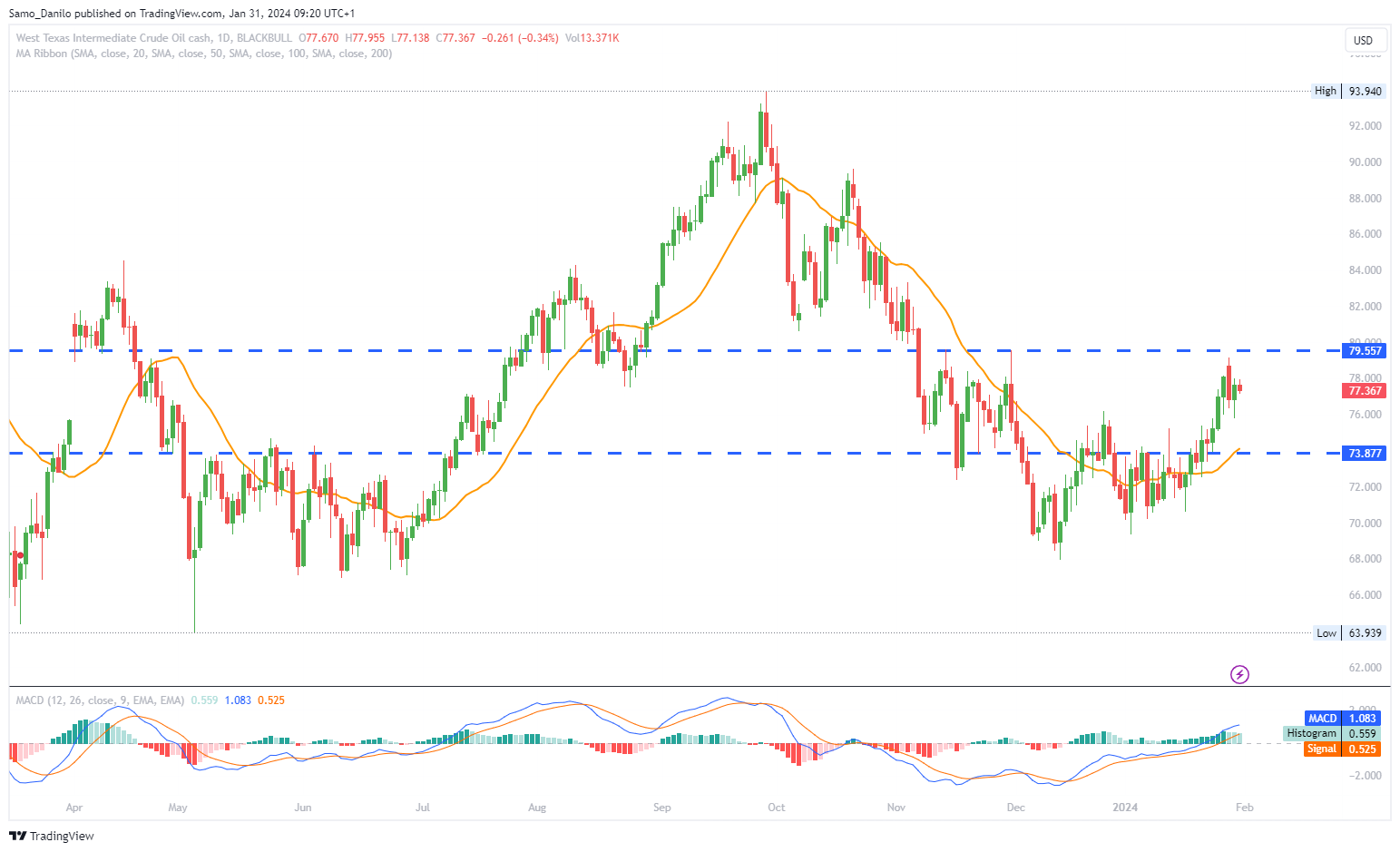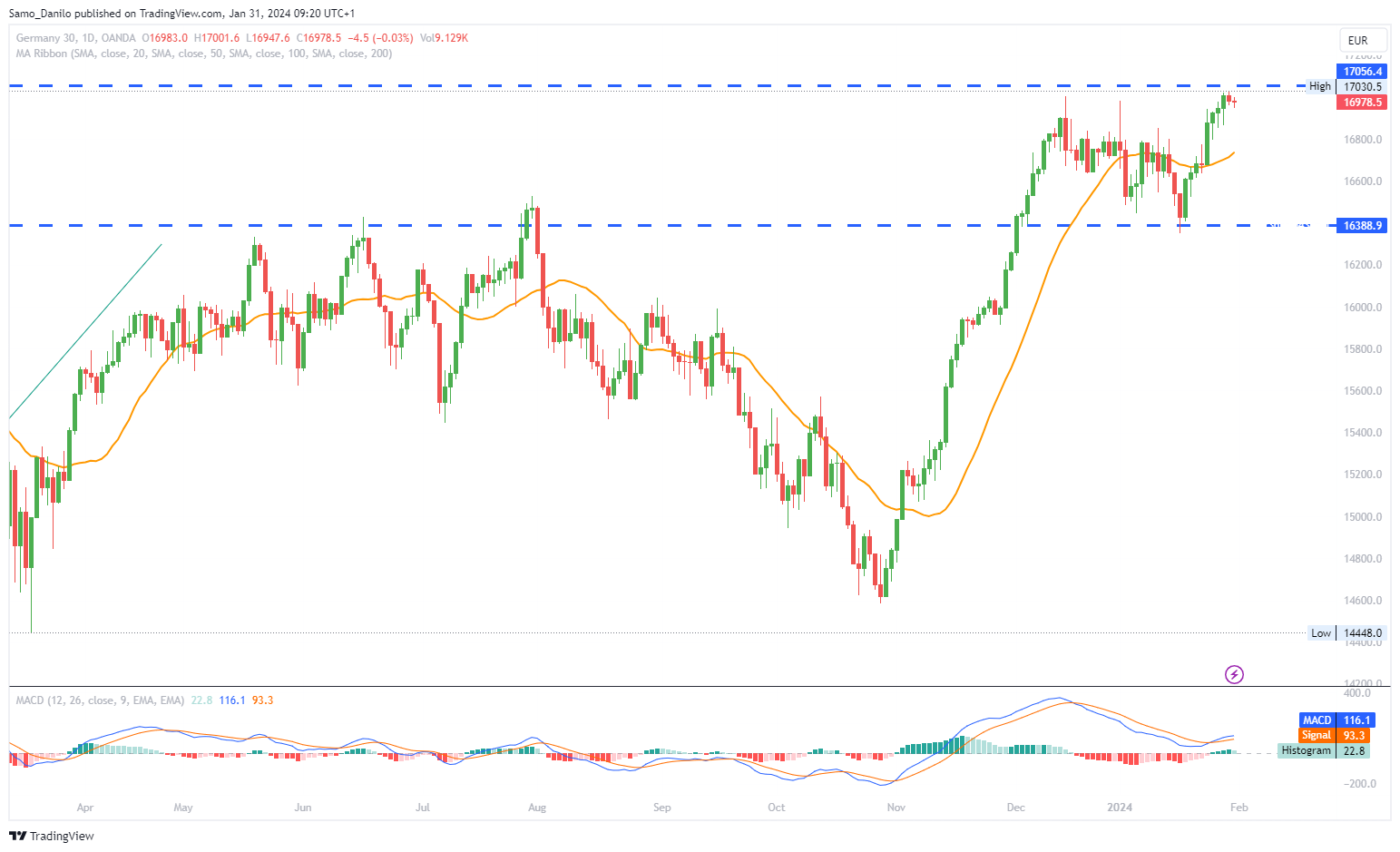EURUSD
- The EUR/USD pair faced selling pressure during the early European session on Wednesday, dropping to the 1.0815 region. This puts it within striking distance of its lowest level since December 13, which was touched earlier in the week.
- Market participants are maintaining a cautious stance, considering the dynamics of the US dollar, and awaiting the upcoming Federal Open Market Committee (FOMC) meeting scheduled for January 31. The consensus expectation is for the Federal Reserve to keep its Fed Funds Target Range (FFTR) unchanged at 5.25%–5.50%. The uncertainty around the FOMC meeting is influencing market behavior.
- Aside from the FOMC event, market participants are also looking ahead to the publication of the US Nonfarm Payrolls towards the end of the week. This economic indicator, which provides insights into the US labor market, is contributing to the overall cautiousness among traders.
- European Central Bank (ECB) President Lagarde's dovish communication is seen as a restraining factor on the price movement of the euro. Her statements, emphasizing the ECB's commitment to data dependence and leaving room for a potential rate cut in the future, are affecting the sentiment around the euro.
- On the domestic data front, flash Q4 GDP figures for the broader euro area were released. The data showed that the bloc's economy expanded marginally by 0.1% Year-on-Year (YoY) and came in flat compared to the previous quarter. These figures provide insights into the economic performance of the Eurozone.
Closing statement: The EUR/USD pair is facing selling pressure, influenced by the cautious market sentiment ahead of the FOMC meeting, the focus on US economic indicators, and the impact of Lagarde's dovish communication. Additionally, domestic data such as the flash Q4 GDP figures for the Eurozone are contributing to the overall market dynamics.
GBPUSD
- The GBP/USD pair is continuing its decline for the second consecutive session on Wednesday, reaching near the 1.2680 level during the early European trading hours.
- Investors are expected to closely monitor the release of the US ADP Employment Change data scheduled for Wednesday.
- This data is often considered a precursor to the more comprehensive US Nonfarm Payrolls report, which is set to be released later in the week. The employment data will likely influence market expectations regarding the labor market conditions in the United States.
- Bank of England’s (BoE) Governor Andrew Bailey, in remarks made in December, indicated that there was "some way to go" before inflation would return to the central bank's 2.0% target. This suggests the BoE's belief in a gradual path to achieving its inflation target, possibly influencing the outlook for monetary policy.
- Additionally, members of the BoE have stressed the importance of maintaining a prolonged period of restrictive monetary policy to address inflation concerns. This stance by the BoE, emphasizing a cautious approach to policy normalization, could impact the currency pair.
| SMA (20) | Neutral | |
| RSI (14) | Neutral |
|
| MACD (12, 26, 9) | Slightly Falling |
|
Closing statement: GBP/USD is facing resistance as the US Dollar benefits from a cautious market mood, geopolitical tensions impact investor sentiment, and the UK public's inflation expectations show a decline. Market expectations for the BoE's policy also play a role in shaping the pair's movement.
GOLD
- Gold price is experiencing a pullback, extending from its recent ten-day high of $2,049 achieved during early American trading on Tuesday. This retracement suggests a shift in market sentiment and trading dynamics.
- Markets are characterized by caution as concerns over China's economic situation persist. The official manufacturing data from China indicates contraction for the straight month in January, contributing to the caution among investors. Additionally, escalating geopolitical tensions in the Middle East are factors driving risk-averse trading.
- China's economic concerns are accentuated by the lack of significant stimulus moves by authorities to support the economy. This lack of large-scale stimulus measures may be contributing to market uncertainty and impacting the demand for safe-haven assets like gold.
- Repositioning in the bond market is noted ahead of the Federal Reserve's interest rate decision and Chair Jerome Powell's press conference. This repositioning is reflected in the persistent weakness in US Treasury bond yields. Investors may be adjusting their portfolios in anticipation of potential policy moves by the Fed.
- Data on Tuesday revealed that US JOLTS Job Openings unexpectedly increased in December, suggesting that the labor market remains resilient. This unexpected strength in the labor market could dissuade the Federal Reserve from delivering aggressive rate cuts, impacting the overall market dynamics.
| SMA (20) | Slightly Falling |
|
| RSI (14) | Slightly Rising |
|
| MACD (12, 26, 9) | Neutral |
Closing statement: Gold is witnessing a pullback amid caution in the markets, driven by concerns over China's economy, geopolitical tensions, and repositioning in the bond market ahead of the Federal Reserve's decision. The unexpected strength in US JOLTS Job Openings adds another layer of complexity to the market landscape.
CRUDE OIL
- West Texas Intermediate (WTI) oil prices are retracing recent gains despite an escalated situation in the Middle East. This retracement could be influenced by various factors impacting the oil market.
- Crude oil prices might experience a positive impact following the International Monetary Fund's (IMF) recent update on global economic growth. The IMF has revised its forecast, indicating expectations of stronger growth, particularly in the economies of the United States and China. Positive economic outlooks for major economies often contribute to increased demand for oil.
- The Chinese monthly Non-Manufacturing Purchasing Managers' Index (PMI) for January showed an improvement in the performance of China's service sector, surpassing expectations. This positive economic indicator from China, a major consumer of oil, could influence oil prices positively.
- The American Petroleum Institute (API) released US Weekly Crude Oil Stock data on Tuesday for the week ending January 26, indicating a decrease of 2.50 million barrels. This drawdown in crude oil stocks suggests potential tightening of supply, which can impact oil prices.
- The market is anticipating the Energy Information Administration (EIA) to release improved Crude Oil Stocks Change figures on Wednesday. This data release will be closely watched by investors and traders for insights into the supply and demand dynamics in the oil market.
| SMA (20) | Slightly Rising |
| |
| RSI (14) | Slightly Rising |
| |
| MACD (12, 26, 9) | Rising |
|
|
Closing statement: WTI Crude Oil prices have ticked higher, supported by escalating geopolitical tensions in the Middle East. The potential impact of a US-Iran confrontation on global oil supply is a significant consideration. Market participants are cautious ahead of the FOMC meeting, and the upcoming API stockpile data release may add further impetus to oil prices.
DAX
- The German economy contracted by 0.3% quarter-on-quarter in Q4 after stalling in Q3. Economic contractions in consecutive quarters raise concerns about the overall economic health, and investors are likely to closely monitor developments and data to gauge the extent of the impact.
- In contrast to Germany, the Eurozone as a whole avoided a contraction in Q4 after experiencing a 0.1% shrinkage in Q3. Stagnation in the Eurozone economy in Q4 suggests a level of stability, but uncertainties remain, especially considering the challenges posed by the pandemic and other geopolitical factors.
- On Tuesday, the US economic calendar and corporate earnings played a significant role in driving demand for DAX-listed stocks. Positive signals from the US, including robust consumer confidence and JOLTs Job Openings, may have contributed to investor confidence in the global economic outlook.
- Germany's Retail Sales fell by 1.6% month-on-month in December, compared to a 2.5% decline in November. This data provides insights into consumer spending trends, a crucial component of economic activity. A decline in retail sales may raise concerns about the strength of domestic demand.
- German inflation figures are closely watched as they could influence the European Central Bank's (ECB) rate path. If the German annual inflation rate softens from 3.7% to 3.0%, it may impact expectations regarding ECB monetary policy decisions.
| SMA (20) | Slightly Rising |
| |
| RSI (14) | Rising |
|
|
| MACD (12, 26, 9) | Slightly Rising |
|
Closing statement: In summary, the DAX is influenced by a mix of domestic and international factors, including economic data from Germany, the overall Eurozone economic performance, signals from the US economic calendar, and corporate earnings. Investors will likely continue to monitor these factors for insights into market trends.
